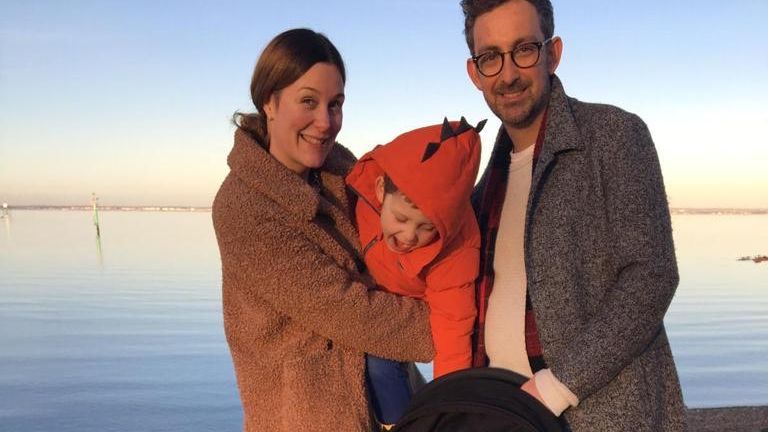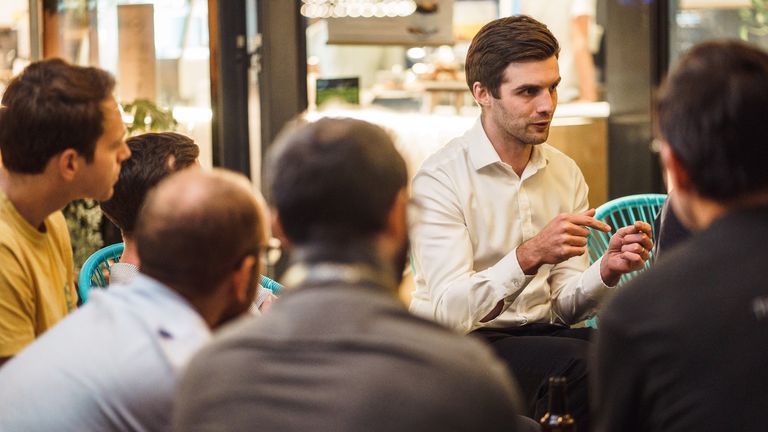Father calls for more postnatal depression support for men after having breakdown
Five years ago marked the birth of James Bhattacherjee’s first child, Ted. It also marked a full mental breakdown and James being absent for the first four months of his baby’s life.
It’s estimated that one in five men experience anxiety after becoming a father and within the first year one in 10 develops postnatal depression.
The risk of depression continues after this time with a 68% increase in risk during the first five years of their child’s life.
With men less likely to verbalise their anxiety than women and even less likely to seek help, James says dads need much better support to help them transition through this time.
His own experience of mental health decline had many factors, but his wife Hannah’s pregnancy and his transition into fatherhood was the trigger.
He tells Sky News: “It was all a build-up. I was really trying to keep a lid on it because I remember so clearly thinking I have no right to feel the way I feel, and how dare I make this about me. I’m not the one who’s pregnant, growing a human, exhausted, with hormones all over the place whilst holding down a demanding job, so just sort yourself out because no one cares how you are. Everyone asks mums-to-be how they’re feeling all the time; often to the point of invasion and annoyance.
“But when they asked me, I told myself it was out of politeness rather than actual concern, so just nodded and hoped tomorrow would feel different. But the next day you feel worse. The next day you’re one day closer to failing as a father.”
The thought of failing his family both emotionally and financially accelerated the feeling that he was falling apart.
He’s now working to make sure that men aren’t just “a plus one” in pregnancy but are supported in their journey to becoming a dad.
James, pictured at the top of this story with baby Ted in hospital, says this is the only photo they have together for the first four months of his son’s life.
He says he was incapable of smiling, despite desperately trying. The next photo they have is months later of James feeding Ted solids.
For that time in between, James was absent. James’ wife and baby moved to his mum’s for support as Hannah was faced with looking after a newborn while her husband was going through a breakdown.
Hannah phoned every day but there was a three-week period where James cut himself off completely, unable to cope.
James’ relationships were heavily impacted.
He says: “I couldn’t relate to anyone. I had failed as a man, a husband, and now a dad. Hannah asked me at one point if I loved Ted, but back then I couldn’t say yes. I couldn’t feel anything. It wasn’t that I blamed him in any way at all. He deserved better than me and he represented everything that was my failure.”
James had intensive therapy and eventually moved home with Hannah and Ted. He had been a currency dealer for over a decade and following a long absence, made it back to work. After James’ career had been a central part of his life, he says a sense of embarrassment at being labelled “unfit for work” was another reason he avoided help sooner.
James says becoming a dad the second time around to son Charlie was a different story.
“A moment of utter euphoria and a realisation of what child birth for a father can feel like,” he says.
“I was in a totally different place. Hannah has been amazing throughout and I’m so grateful we are where we are but it’s been quite the journey. My experiences allow me to grasp the enormity of just how brilliant it is to be a dad.”
Alongside his job, James has a new role. He is now a “Dads’ Champion” for Happy Parents. Happy Baby. which runs antenatal courses.
He says: “I had two wildly different experiences of becoming a dad. And I know I’m a more extreme case of what most men and partners typically go through but there’s a scale and it’s a transition. Even if the bulk of men experience diluted versions of some of the feelings I felt, they need to be talked about and as a society, we need to do more.
“I’m working with Happy Parents. Happy Baby. because this is what they’re all about and by teaming up, I can do my little bit for the thousands of dads who are coming through the course each year.”
If you are impacted by the issues outlined in this article, you can get support from your GP, Samaritans, or Mind.
Source: Read Full Article




